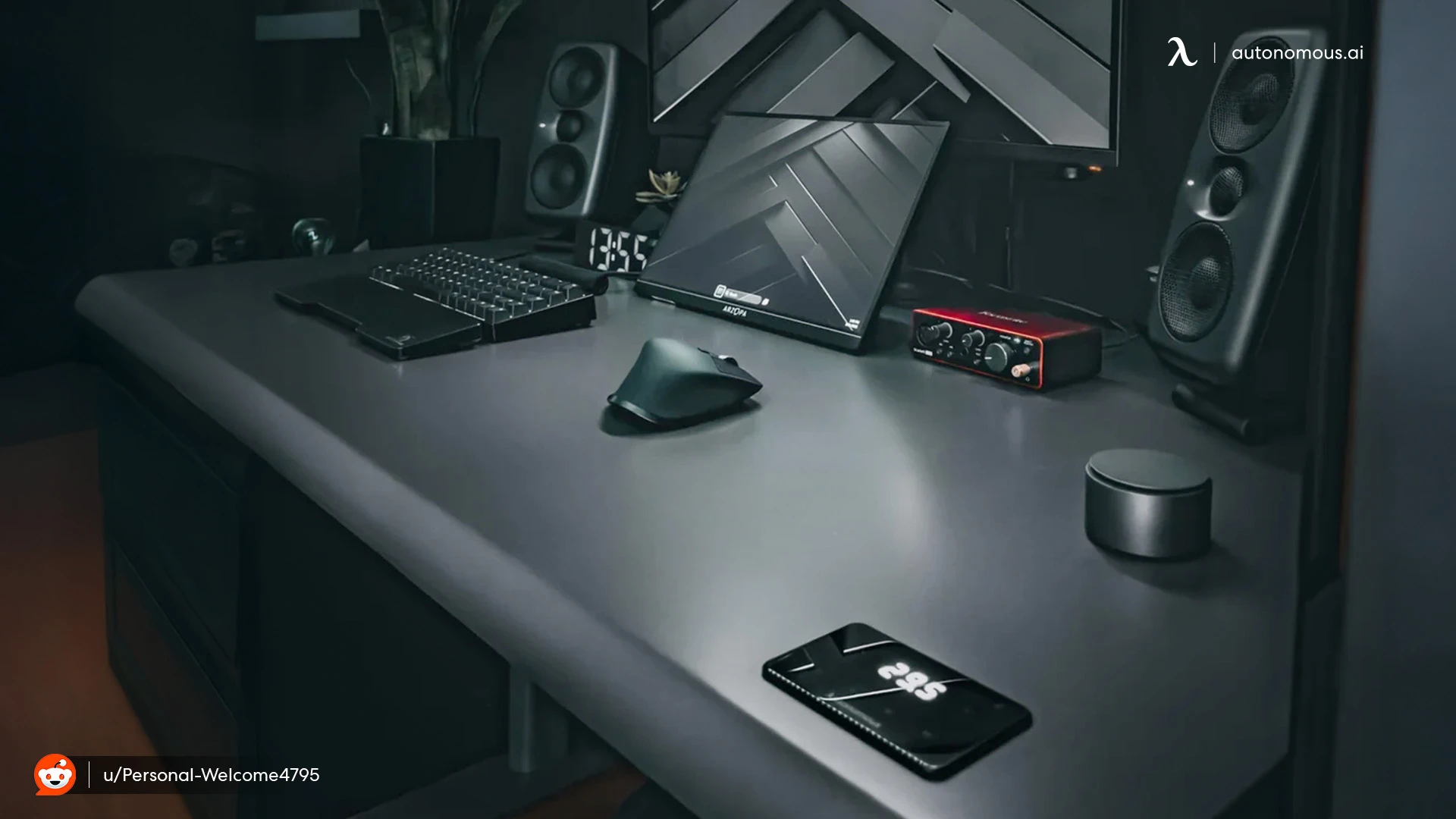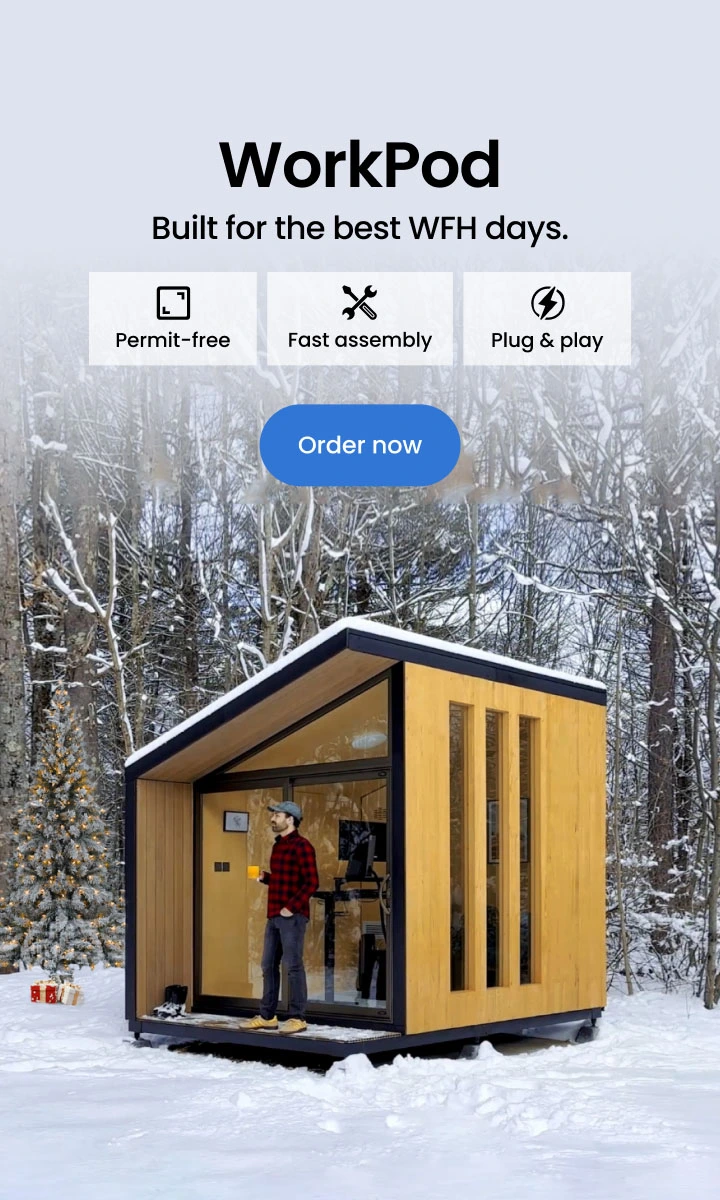.webp)
How Taking a Break At Work Makes You More Productive
Table of Contents
A lot of us grew up believing productivity means staying busy every second — inbox zero, back-to-back calls, no pauses. And when things get hectic, it’s easy to assume that if you take a break at work, you’re falling behind or being lazy. In reality, the opposite happens. Strategic pauses reset your brain, protect your focus, and help you show up sharper for the rest of the day. This guide walks through why stepping away isn’t a weakness, but one of the smartest habits you can build for long-term performance.
The Science Behind Taking A Break At Work
Feeling guilty when you take a break at work is common. Many employees still equate productivity with being busy every minute, so pausing can feel like slacking. But modern research says otherwise — regular breaks play a key role in employee well-being and help maintain a truly productive work environment. Short, intentional pauses protect focus, sustain energy, and improve long-term performance.
A large academic review of workplace micro-breaks found that short pauses meaningfully improved energy and reduced fatigue, especially during demanding tasks. Another study following employees throughout their workday showed that brief breaks — even just a few minutes — restored mental clarity, lifted mood, and helped maintain motivation over time. In simple terms, stepping away gives your brain a chance to reset so it can come back sharper.
Instead of pushing through exhaustion, think of breaks as part of your workflow — not a disruption to it. A structured pause now prevents burnout later. And if you ever wonder, “do you have to take a break at work?” or “are you required to take a break at work?”, remember: your brain doesn’t just benefit from rest, it depends on it to function at its best.
To move past break guilt, normalize it in your routine. Set small reminder cues, create predictable pause patterns, and talk openly with coworkers so breaks feel like a shared habit, not a secret indulgence. The more intentional you are, the easier it becomes to take a break from work for mental health and long-term performance — not because you’re lazy, but because you’re working smart.
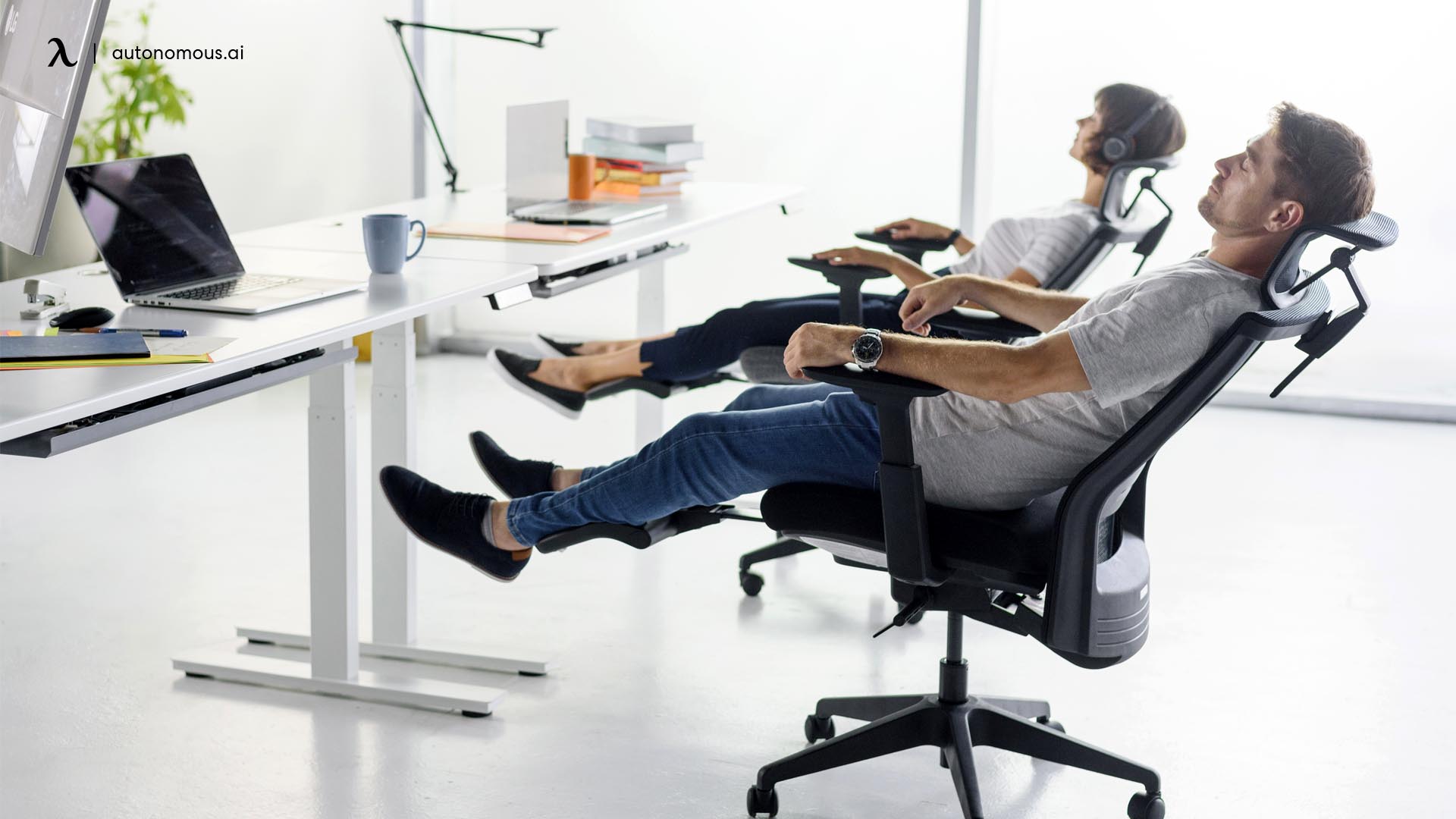
How Often Should You Take a Break at Work?
The rhythm of your day matters just as much as the work you do. If you’re unsure how often you should take a break at work, think in cycles — intense focus followed by intentional pause. This keeps your brain from slipping into autopilot mode and protects your energy over long stretches. Below are the most popular break structures people use to stay sharp without losing momentum.
1. 52/17 Method
This approach pairs a long focus window with a meaningful rest. Work for 52 minutes, then step away for 17. It feels generous at first, but that extra time allows your mind to fully reset so you return with fresh attention. Many choose it when they want to take a break at work without feeling rushed or guilty.
2. Pomodoro (25/5)
Short and structured: work 25 minutes, break 5 minutes. After four cycles, take a longer pause. This is great for task-heavy days or when your motivation dips. The Pomodoro technique is especially helpful if you tend to push yourself until you’re drained. If you’re thinking, “do I have to take a break at work this often?”, remember — these small pauses keep you from hitting a mental wall later.

3. 90-Minute Deep-Work Cycles
Human attention naturally peaks in roughly 90-minute waves. Focus deeply during that window, then reset for 10–20 minutes to restore your mental bandwidth. This rhythm is especially effective for creative projects, strategic thinking, and problem-solving — the kind of concentration often described as deep work. And if stepping away feels difficult, this approach is a reminder that high-quality output and intentional rest go hand in hand.
4. Micro-Breaks Every Hour
If longer breaks aren’t realistic, micro-breaks offer a flexible option. Stand up, stretch, look away from your screen, or take a few slow breaths. Even 30–60 seconds counts.
These tiny resets help prevent afternoon fatigue and support you when you need to take a break from work for mental health, especially on days stacked with tasks and meetings. Simple movements or office chair exercises can also keep your body active without stepping away.
Different jobs and environments call for different rhythms, but consistency is what matters most. The more you practice structured pauses, the easier it becomes — and the less you’ll question whether you’re required to take a break at work or simply deserve one to stay at your best.
The Best Ways To Take A Break At Work
Not every pause has to look the same. When you take a break at work, the goal is to shift your brain and body out of “task mode” long enough to reset. Different types of breaks offer different benefits, so mixing them throughout your day keeps your energy balanced and prevents burnout.
- Move Your Body
Sitting too long affects posture, circulation, and mood. A short hallway walk or a few desk-mobility moves can recharge you faster than scrolling your phone.
Even small movements count, like shoulder rolls or gentle seated stretching exercises during a quick pause. A little mobility throughout the day keeps your body engaged and helps you stay alert without losing time.
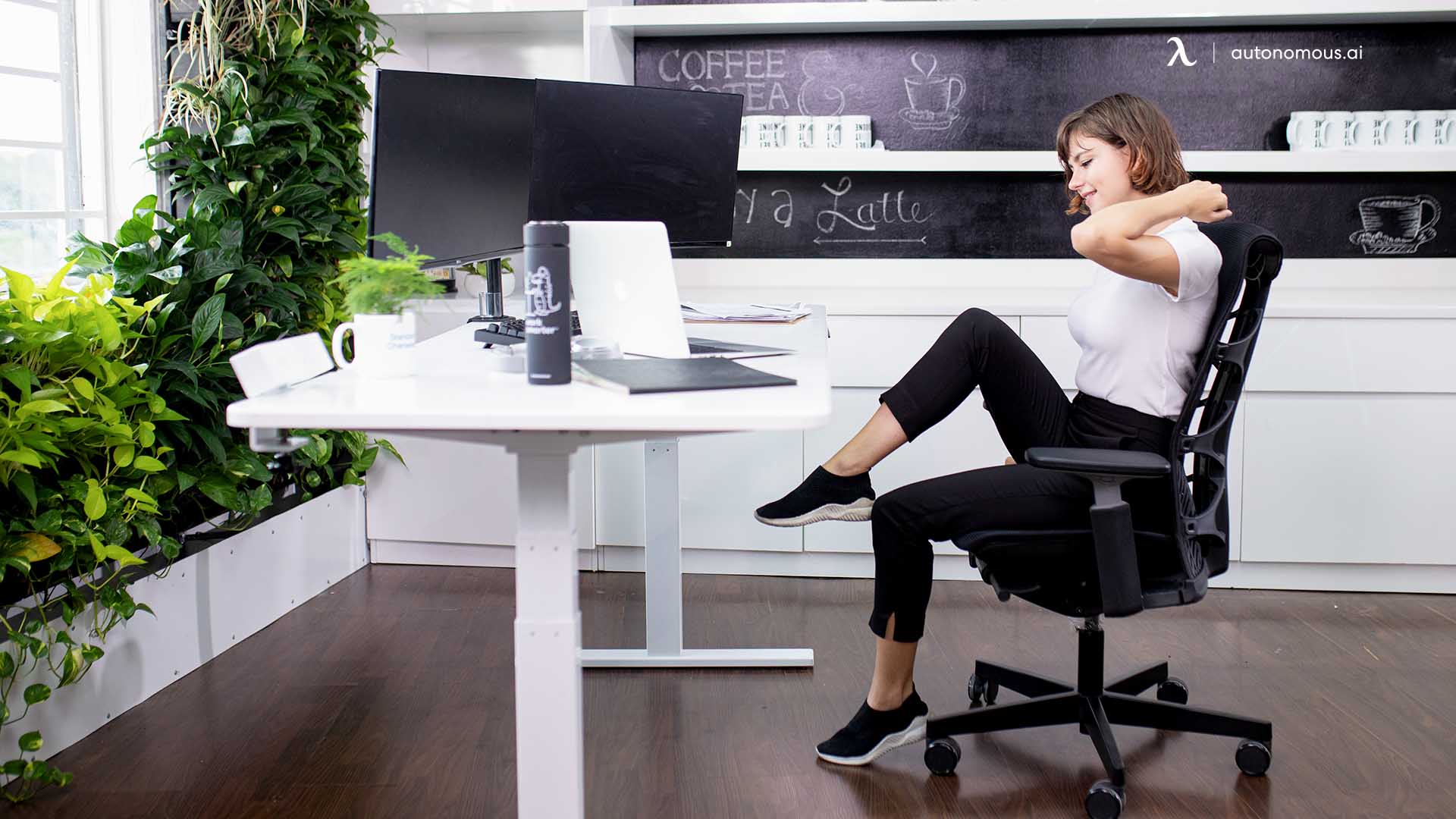
- Step Away From Screens
Give your eyes and mind a real rest. Look out a window, walk outside, or simply sit without your phone. A short digital pause protects your focus and reduces mental noise — especially helpful on days when you feel overwhelmed but still hesitate to take a break at work because things feel nonstop.
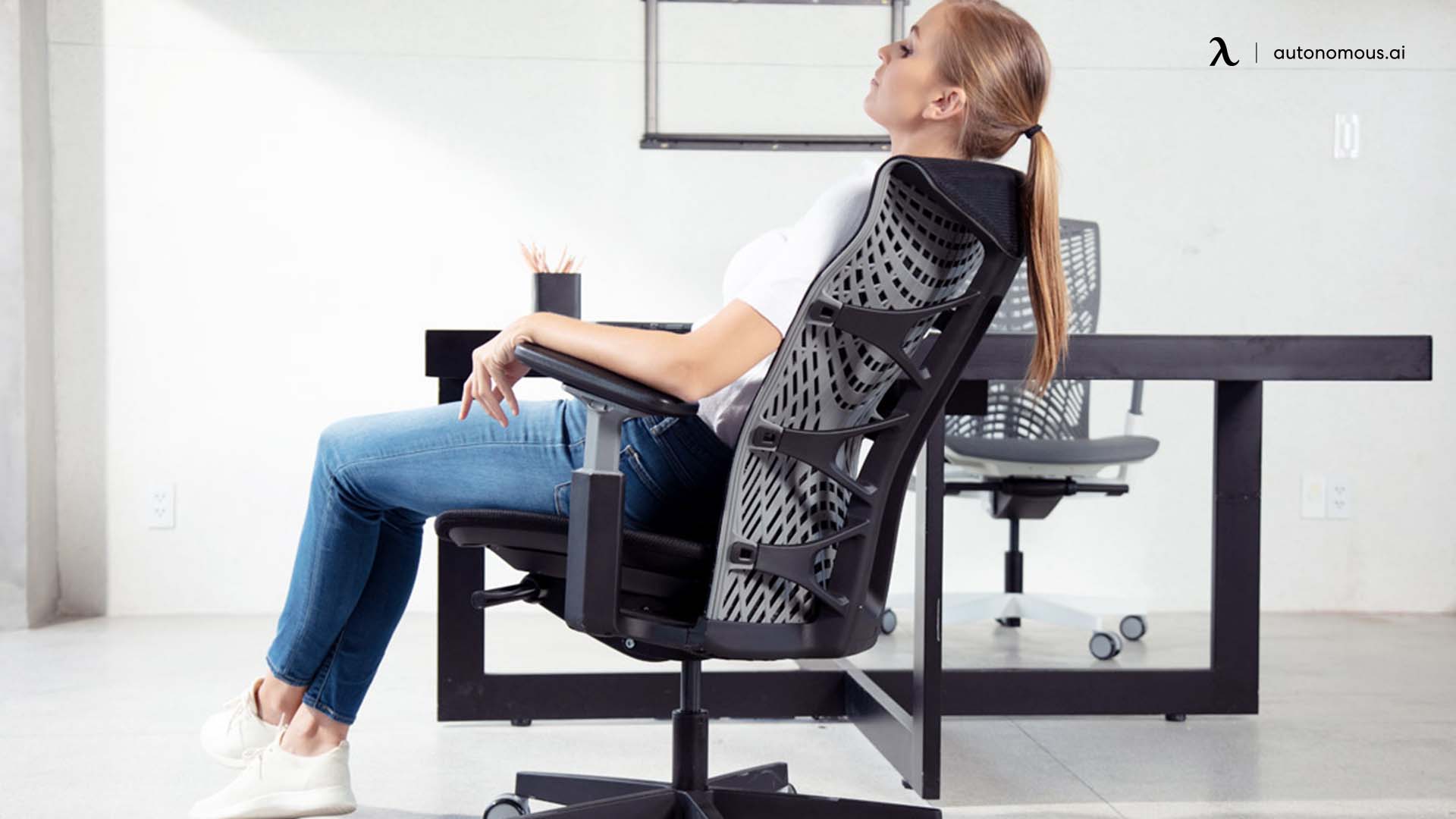
- Shift Your Environment
A change in scenery gives your brain a signal to reset. Move to a lounge, step into a quiet corner, or grab a glass of water away from your desk. If you work from home, even shifting to a balcony or kitchen space helps. Small environment shifts break the mental loop of staring at the same screen in the same spot, making it easier to regroup and come back with a clearer mind.

- Practice A Mindful Reset
Deep breathing, grounding exercises, or closing your eyes for even 60 seconds can calm your nervous system and reset your focus. Helpful breathing exercises can help regulate stress and bring you back into a calmer mental state.
These quiet pauses are especially helpful when you need to take a break from work for mental health, easing mental tension and giving your mind space to settle before diving back in.

- Light Social Connection
A quick chat with a coworker, a supportive message to a friend, or sharing a laugh resets emotional energy. Avoid turning it into a complaint session — choose moments that lift your mood rather than drain it.
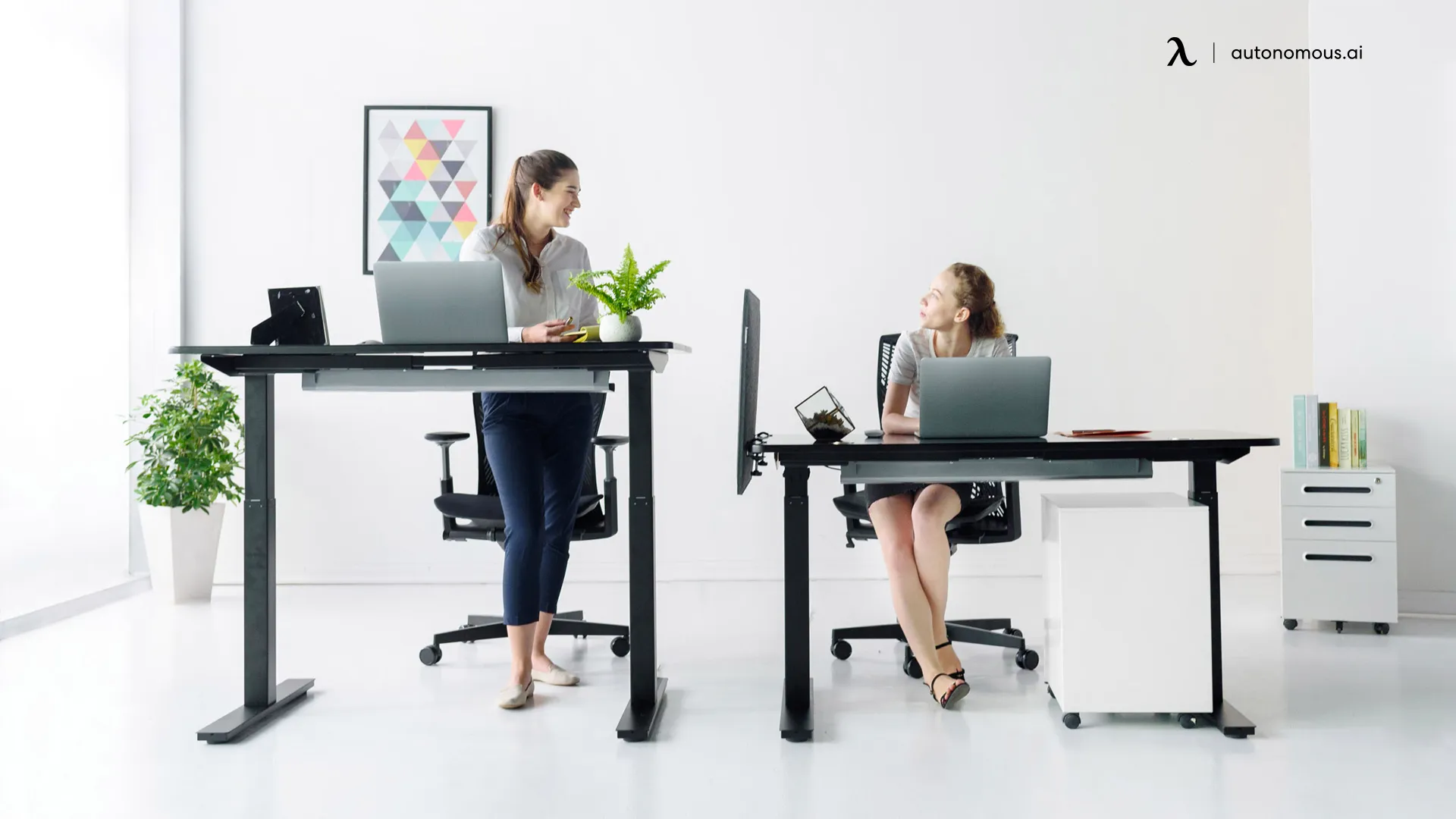
- Hydrate or Refuel
Grab water or a healthy snack. Low hydration and low blood sugar can mimic fatigue and stress, making it harder to concentrate. Small physical cues like this make breaks feel purposeful instead of indulgent.
Breaks aren’t one-size-fits-all. Some days you’ll need movement, others you’ll need silence. The more intentional you are, the easier it becomes to listen to your body instead of asking yourself whether you have to take a break at work — you simply know when it’s time to recharge.
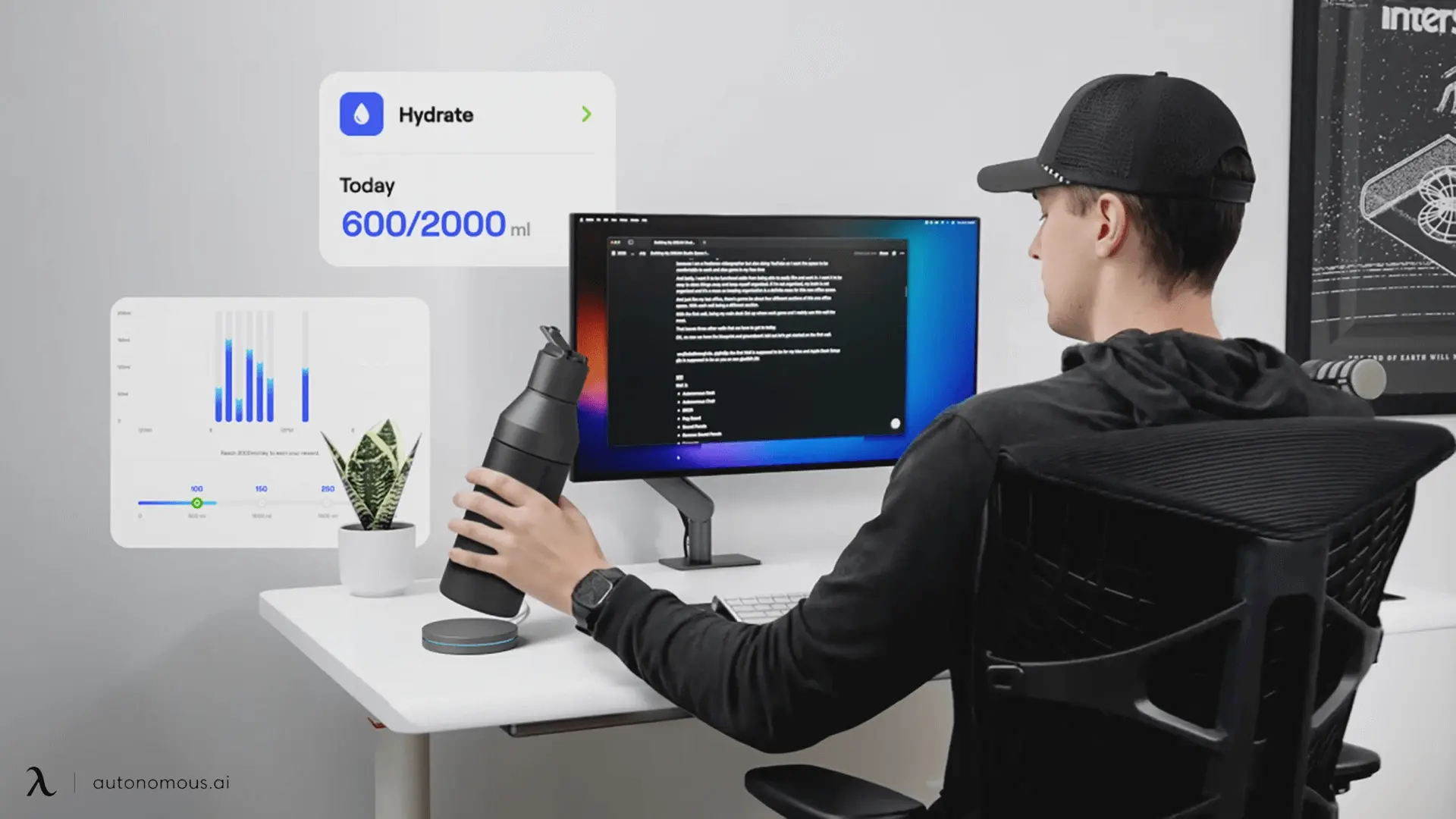
What Not To Do When You Take A Break At Work
Breaks should help you reset — not drain your energy. While it’s easy to fall into autopilot habits, some activities work against the whole point of resting. Knowing what to avoid helps you use your time more intentionally and return with the clarity you need to stay productive.
- Doom-Scrolling And Constant Phone Use
Mindlessly scrolling social feeds keeps your brain in “input mode,” which makes it harder to feel refreshed. Instead of helping you reset, it often adds more noise and stress, especially when you’re already mentally overloaded.
- Working In Disguise
Responding to emails, tidying your inbox, or half-replying to messages isn’t the same as resting. Even if you feel like you’re handling everything fine and wonder, “do I have to take a break at work if I still feel on top of things?”, remember that fatigue often shows up gradually. When you never truly step out of work mode, it eventually catches up. A genuine pause — even a short one — gives your mind a chance to reset so you’re not running on empty later.
- Staying Seated The Entire Time
Remaining in the same position through your break keeps pressure on your spine, hips, and neck, and can tighten muscles even further. Long periods of sitting reduce circulation and make it harder for your body to shake off fatigue, so pausing without moving still leaves you feeling sluggish. A break spent in the same chair often feels like no break at all — your body misses the signal that it’s time to reset.

- Filling The Moment With Errands
If every pause turns into washing dishes, running a quick personal task, or handling admin chores, you’re not actually resting. Breaks are about mental recovery, and constant multitasking works against that.
- Over-Stimulating Your Senses
Loud videos, breaking news, or fast-paced content can flood your brain with stimulation right when it needs downtime. Instead of helping you unwind, they keep your stress system active and make it harder to reset. If you're trying to take a break from work for mental health, opt for something gentle on your senses rather than media that ramps up adrenaline or emotion.
The goal isn’t perfection — it’s awareness. When you take a break at work, choosing the right kind of rest gives your mind and body a chance to reset so you can come back steady, focused, and ready to perform, instead of running on fumes.
General Rules And Workplace Break Regulations
Even with all the science behind rest, many people still wonder, “are you required to take a break at work?” The short answer: most workplaces expect and allow breaks, but specific rules vary by region, industry, and company policy. Instead of thinking in terms of guilt or permission, it helps to understand the general landscape so taking time to reset feels normal and supported.
Most labor standards around the world include some form of protected pause during longer shifts. A common structure is one unpaid meal break (often around 30 minutes) once you pass a certain number of hours, plus shorter rest periods that are typically paid. Under U.S. Department of Labor (DOL) federal guidelines: breaks lasting about 5-20 minutes are generally considered compensable work time, but there is no federal law that requires lunch or coffee breaks. In contrast, under Washington State Department of Labor & Industries (L&I) law, employees must be allowed a paid rest period of at least 10 minutes for every 4 hours worked, and an unpaid meal period of at least 30 minutes if working more than 5 hours in a shift.
These examples highlight that even if it isn’t mandatory to take a break at work under federal law everywhere, many states or employers enforce structured schedules. If you’re unsure, check your employee handbook or local labor board so you know how your company handles breaks instead of guessing.
Whether you work in an environment that strictly enforces breaks or in one that only loosely encourages them, the underlying truth stands: planning to take a break from work for mental wellbeing is not just beneficial — it’s aligned with best practices in modern work culture.
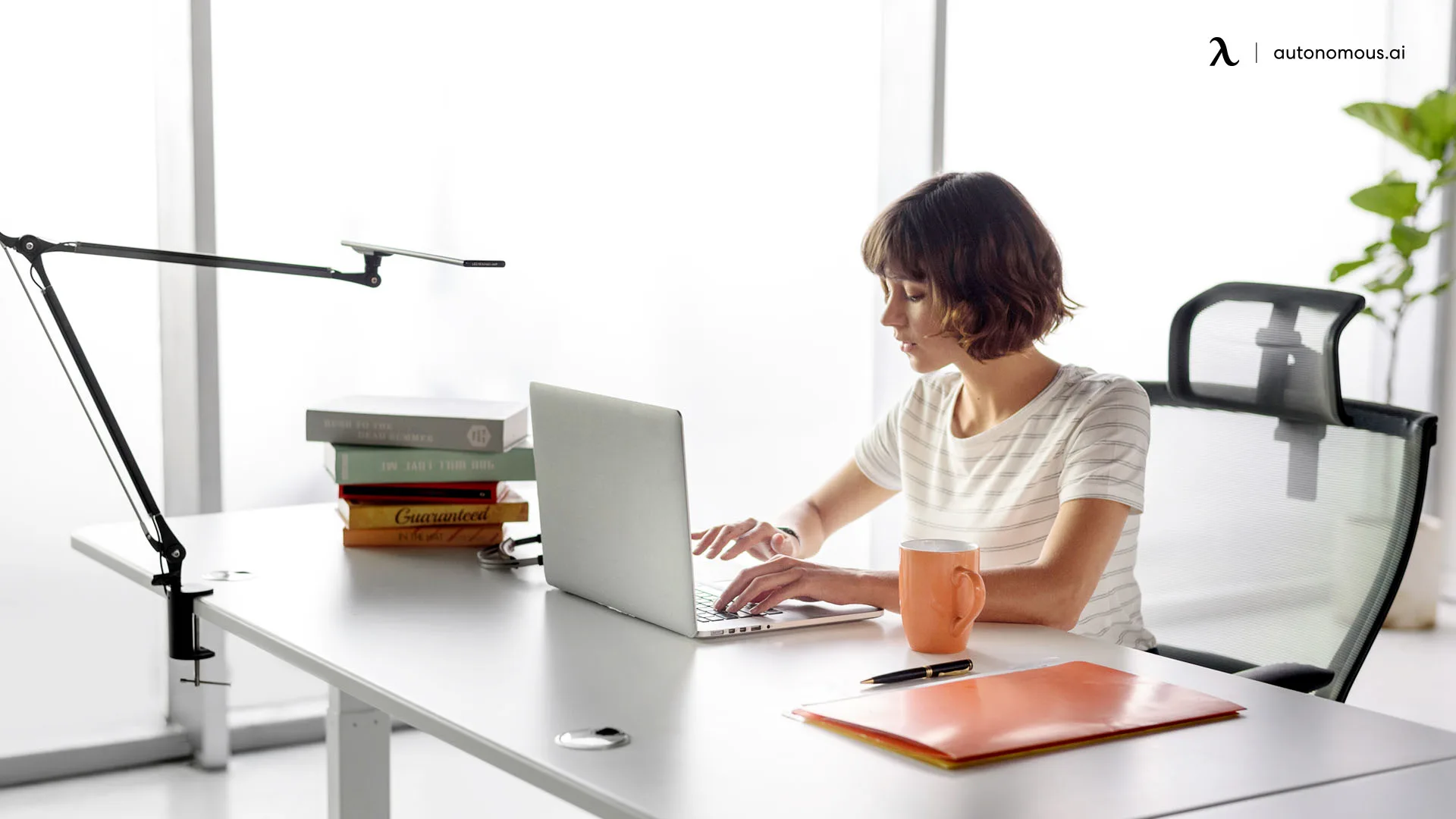
Desk Setup & Habits That Naturally Encourage Healthy Breaks
Taking time away from your screen becomes easier when your environment supports it. Instead of relying on willpower alone, subtle design cues in your workspace can remind your mind and body to pause.
Small healthy habits, like changing posture, stretching, or stepping away briefly, start to feel automatic when your surroundings encourage them. That way, breaks shift from something you “should” do to something that happens naturally throughout the day, especially when you want to take a break at work without disrupting your focus or momentum.
- Standing or Adjustable Desks
Switching positions during the day encourages movement and breaks long sitting stretches. With a standing desk, you can shift from seated to standing in seconds, which naturally signals your body to reset without stepping away completely.
Standing for a few minutes between tasks gives your muscles a change in posture, boosts circulation, and creates a built-in pause that helps you stay alert and refreshed — making it easier to take a break at work without losing momentum. And if you prefer to stay at your desk while moving, simple standing desk exercises can keep your body active and engaged without disrupting your flow.
- Supportive Seating and Posture Cues
A comfortable, ergonomic chair makes it easier to maintain posture and recognize when your body needs a shift. Instead of pushing through discomfort, you learn to respond to early signals — an important part of preventing burnout before it hits.
- Hydration Within Reach
Keeping water close encourages regular sipping, which naturally creates mini-pauses. It’s a small behavioral cue that also supports mental clarity and energy, especially on days when you're juggling multiple tasks and still want to stay grounded.
Tools like a water tracker for bottles can make this even easier by prompting consistent hydration patterns. Those small signals help you pause, reset your posture, and stay grounded without interrupting your workflow.
- Visual Reminders or Timers
Simple timers, desk widgets, or even calendar notifiers can help structure pauses. These cues reduce decision fatigue and make it easier to step away without asking yourself each time, “do I have to take a break at work right now?” — the answer becomes built into your routine.
- A Dedicated “Pause Spot”
Whether it's a reading chair, an outdoor bench, or a quiet corner at home, having a space away from your primary desk gives your brain a physical signal to unwind. This can be especially supportive if you often need to take a break from work for mental health and decompress before returning to tasks.
By shaping your workspace with intention, you support your ability to pause — without constantly questioning whether you’re allowed or required to take breaks. The setup works with you, making recovery part of your workflow instead of a disruption to it.
FAQs
Is it okay to take breaks at work?
Yes, taking a break at work is not only okay but beneficial. Breaks help restore focus, reduce fatigue, and increase productivity; skipping them doesn’t make you more efficient, it can mean you peak earlier and decline faster.
What are the rules for a break at work?
Break policies depend on where you are and the employer’s practices. At the federal level in the U.S., there’s no requirement for meal or rest breaks for adult workers; however, if a break of about 5-20 minutes is provided, it typically must be paid and counted as work time.
What is Michigan’s law on breaks?
In Michigan, employers aren’t legally required to provide rest or meal breaks for employees age 18 or older. Minors working 5+ continuous hours must receive a 30-minute uninterrupted break, but adult workers have no mandatory break rights under state law.
How long are breaks supposed to be legally?
Legally, the length of breaks varies by jurisdiction and employer. Under U.S. federal law, short rest breaks (about 5-20 minutes) must generally be paid; longer meal breaks (30 minutes or more) can be unpaid if employees are completely relieved from duty.
How long should you work before you take a break at work?
A common guideline is that you should pause every 50-90 minutes of sustained work. Research shows that human attention spans tend to decrease after this window, so when you take a break at work within this cycle your focus and energy rebound more effectively.

Can you count coffee or snack breaks when you take a break at work?
Yes, nutrition or beverage breaks can count as a break at work if they involve stopping active work and stepping away from work tasks. However, if you stay in work mode (e.g., still replying to emails) the benefit of the break is reduced.
Does taking a break at work really boost productivity or is it just downtime?
Taking a break at work doesn’t signal laziness — it helps your brain recover, reducing fatigue and improving performance over time. Meta-analysis of micro-breaks found clear gains in energy and task effectiveness when workers paused intentionally.
How many breaks should you take at work during an 8-hour shift?
While there’s no universal rule, many productivity studies suggest 3-4 short breaks plus a longer break (like lunch) keep performance steadier than working nonstop. Planning to take a break at work every hour or so (including micro-breaks) aligns with how attention naturally fluctuates.
Is taking a break at work good for mental health?
Yes. Taking short, intentional breaks helps reduce stress, lower emotional fatigue, and reset your mindset. Micro-pauses or breathing exercises support clarity and protect your mental health throughout the day.
What type of break is best when you take a break at work?
An effective break at work involves resetting mental or physical load — examples include standing or stretching, stepping away from screens, or doing grounding/breathing for a minute. The key is disengagement from task mode, not simply changing tasks.
How do I remind myself to take a break at work?
Set gentle timers, use reminder apps, or follow structured methods like the Pomodoro cycle. Habit cues — such as stretching after finishing a task or standing when switching projects — make it easier to take a break at work consistently.
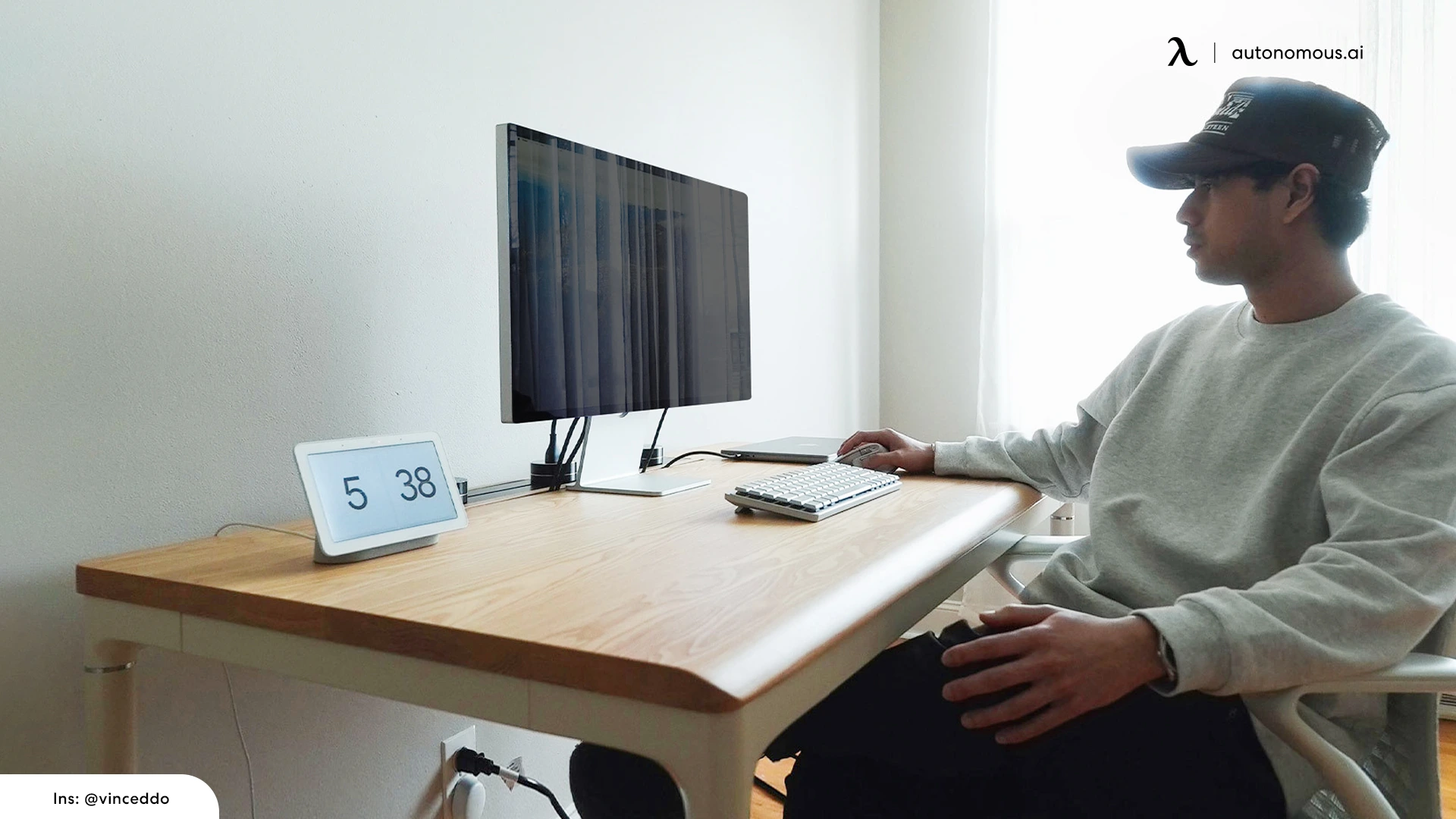
Final Words
Taking a break at work isn’t a pause in productivity — it’s part of sustaining it. When you step away briefly, your brain resets, your body releases tension, and your energy returns steadier and sharper. Whether it’s a micro-pause between tasks, a mindful moment to breathe, or a structured break cycle, these resets protect performance and support long-term well-being.
So instead of asking whether you should take breaks, see them as a natural part of working well. The more intentional you are about giving your mind and body space, the more consistently you show up focused, calm, and ready for what’s next.
Spread the word
.svg)

